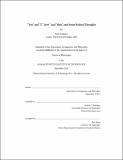"You" and "I", "now" and "then", and some related thoughts
Author(s)
Santorio, Paolo, Ph. D. Massachusetts Institute of Technology
DownloadFull printable version (504.7Kb)
Other Contributors
Massachusetts Institute of Technology. Dept. of Linguistics and Philosophy.
Advisor
Robert C. Stalnaker.
Terms of use
Metadata
Show full item recordAbstract
The overarching theme of this dissertation is the relationship between information and context-how context interacts with the contents of speech and thought. I pursue three issues within this broad theme. Chapter 1 concerns indexicality. On classical accounts, indexicals like I, you, and now invariably refer to elements of the actual context of speech. This feature sets indexicals apart from definite descriptions like the best soccer team in Europe. I argue that the orthodoxy is wrong: all indexicals are subject to shift, exactly like descriptions. More precisely, indexicals are syntactically akin to logical variables and hence can occur both free and bound. After arguing for the new view, I show how it affects our general picture of context-dependence in semantics. Chapter 2 concerns definite and indefinite descriptions, like the richest banker on Wall Street and a stockbroker. Descriptions are often treated as quantified phrases, sharing their structure with quantified phrases; hence they are taken to belong to a different semantic kind from referential expressions. Contrary to this view, I argue that all descriptions can involve a referential component in their meaning. This referential component is independent of the descriptive material and hence constitutes a separate dimension of the semantics of descriptions. Chapter 3 investigates how subjects' degrees of belief should evolve as their position in the world changes-for example, as time passes. I argue that we should recognize a new kind of cognitive operation, cognitive relocation. Relocation manipulates a special kind of information, de re information about time; moreover, it is a way of retaining rather than gaining information. The relocation account is able to reconcile intuitions about a well-known example, the Sleeping Beauty problem, with an intuitively plausible principle about context-dependent information, the Relevance-Limiting Thesis.
Description
Thesis (Ph. D.)--Massachusetts Institute of Technology, Dept. of Linguistics and Philosophy, 2011. Cataloged from PDF version of thesis. Includes bibliographical references (p. 113-120).
Date issued
2011Department
Massachusetts Institute of Technology. Department of Linguistics and PhilosophyPublisher
Massachusetts Institute of Technology
Keywords
Linguistics and Philosophy.